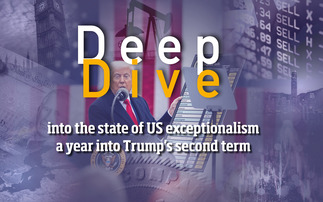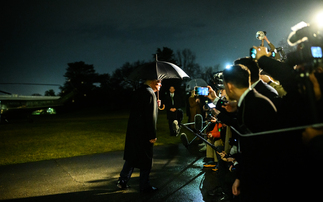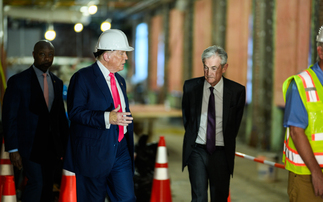In the first of a special three-part Big Question, fund managers give their views on whether President Trump can deliver on his campaign promises, and what this will mean for markets.
Cyrique Bourbon, portfolio manager at Morningstar Investment Management Europe
Anti-globalisation trend
Whether President Trump is granted sufficient latitude to implement his fiscal stimulus programme remains to be seen, but the biggest risk lies somewhere else. President Trump epitomises the anti-globalisation trend that has gained popularity amongst voters in recent years.
His clearest initiative is to support businesses in the US, with early evidence of jobs being redirected internally. This is a double-edged sword. While the market views this dynamic favourably, it increases the risk of deteriorating the post-war world order and could be highly disruptive to global trade relations.
Possibly the biggest risk this year is clashing with China. It is plausible President Xi Jinping will show a hard line in a year where he asserts his power in the run-up to the party's 19th Congress.
From a valuation perspective, there are doubts about how much of this downside risk is priced in, as US markets hit new all-time highs based primarily on multiple expansion.
Six times President Trump has already shaken investment markets
Stephen Mitchell, head of strategy, global equities at Jupiter Asset Management
Checks and balances
I believe investors remain cautious on the whole about the potential impact of a Trump presidency, restrained or perhaps comforted by the famous 'checks and balances' of the US political system, which means three separate branches of government have a final say over what measures President Trump can implement.
The stars appear to be aligned on repatriating overseas cash and some cuts to corporate taxes, but the size of US debt means President Trump is unlikely to deliver everything he wants.
He will find a sympathetic ear on easing regulations, particularly for the financial sector, but when it comes to infrastructure, planning processes grind slowly and I believe investors may have priced in too much good news.
Trump has boosted confidence, arm-twisting companies into creating jobs, which can be self-fulfilling. One of the key ingredients missing in the post-2009 recovery has been investment by corporates. Now, according to US banks, their clients are more willing to invest.
Watch the yield curve - if it keeps steepening it is because investors believe he can deliver.
Ian Heslop, head of global equities at Old Mutual Global Investors
Twitter tantrums
Caution is warranted when forecasting the direction of markets on the basis of macro or geopolitical data. Although recent US economic data remains supportive in the short term, market sentiment is likely to be more important, as it was last year.
President Donald Trump broadcasts his views with few of the filters ordinarily expected of someone in high office. His policy details may be described as 'fluid', which suggests increased volatility.
His protectionist rhetoric could become a worry for markets if the traditionally free-market stance of the US were to change.
The US equity market will remain of central importance to investors. The euphoria since President Trump's election victory finds its justification in his pro-business tax stance and the stimulative effect of his planned huge spending on infrastructure.
However, he is unlikely to get all his spending plans through Congress, which is far more fiscally conservative than he is.
Failure to do so could lead to market disappointment, while spending on the scale he wants could be a double-edged sword, causing not only faster growth but also increased inflation.













